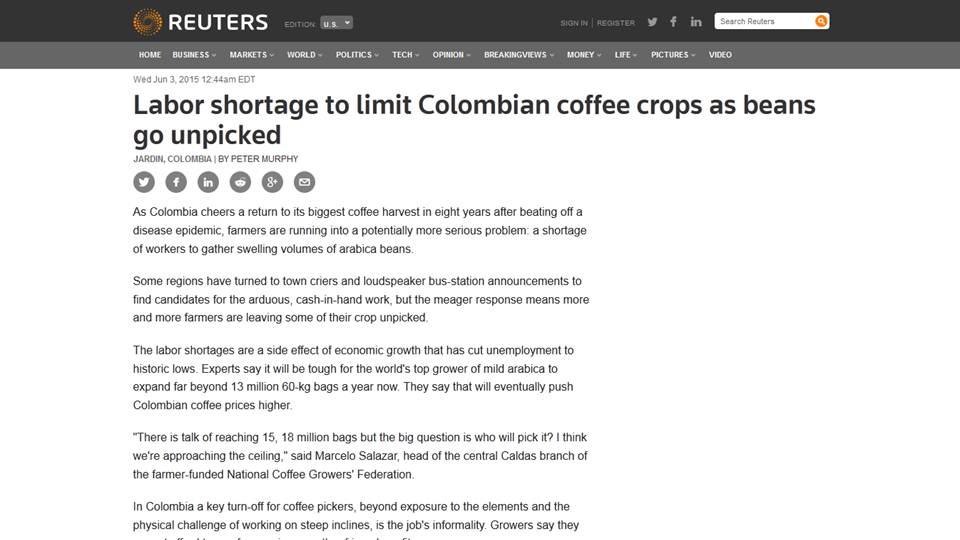Over the past year and a half, I have done some reading about two related and complementary disciplines: horizon-scanning and scenario planning. The first refers to intentional and systematic efforts to gather and analyze information about threats and opportunities that loom; the second to how we use that intelligence to identify likely future scenarios and develop strategies that will help us navigate them more effectively.
There are some companies in coffee that are pretty good at identifying and seizing opportunities in the marketplace. The dizzying pace of innovation and the occasional introduction of disruptive technologies over the past 10 years can attest to that. And lots of companies are effectively identifying and heading off challenges in their own supply chains. But we haven’t always been as good at identifying collective threats before it is too late.
The coffee leaf rust crisis in Central America during the 2012-13 crop year is a recent and painful example. There were people calling attention to coffee leaf rust before the epidemic hit Mesoamerica, but we failed to recognize the magnitude of the threat. Peter Baker, the coffee and climate scientist, reminded the First Coffee Rust Summit in Guatemala City in 2013 that there were warnings as early as 2010. There is, of course, no guarantee we would have been able to effectively mitigate the threat posed by coffee leaf rust even if we had done a better job of what the literature on horizon-scanning calls “amplifying weak signals.” But our collective failure to amplify this weak signal meant we were blindsided by something we could have seen coming.
Labor markets in coffee-growing countries in the Americas have been emitting a steady but weak signal in recent years that has been growing stronger but could still use some amplification: labor shortages represent a threat to the viability of coffee production.
.
Reuters news service published this story earlier this month about labor shortages in the coffeelands in Colombia. It is one of the few news stories that have been published on the topic in English, but that doesn’t make it a new story. Securing labor for the coffee harvest in Colombia has been a perennial challenge in recent years–one that has been more difficult as Colombia’s production gone from just over 7 million bags per year to nearly 13 million. There is more coffee than ever in Colombia, and not enough workers to harvest it.
Why?
Well, for one, it is hard work.
It doesn’t pay particularly well.
And few farmworkers have the kinds of formal contracts and labor protections they can secure in other sectors of Colombia’s economy.
In other words, there are lots of better ways to make a living.
This is especially true in countries like Colombia whose economy has been booming while economies in “developing” countries have been slumping. But Colombia isn’t the only one. Similar stories have been reported over the years in coffee origins from Mexico to Peru and many places in between.
The specialty coffee community may not feel moved by the plight of coffee farmworkers. But it may be moved to action by the fact that the lack of farm labor in the coffeelands could mean steadily less coffee for the marketplace.
Addressing this challenge won’t be easy, because there is structural pressure on wages. One estate owner told me recently that “this is the one problem I have on the farm that I don’t know how to solve.” His ability to offer more money to workers is constrained by the economics of the coffee market: he simply doesn’t earn enough for his coffee to pay more than he is already paying.
We need to talk about farmworkers before it is too late. A conversation by itself won’t solve anything, of course, if it doesn’t lead to changes in the low wages and poor working conditions that have made work on coffee farms unattractive in many producing countries. But the first step in solving a problem is acknowledging we have one. And we do.
If we have a full-blown labor crisis in coffee, we can’t say we didn’t see it coming.



